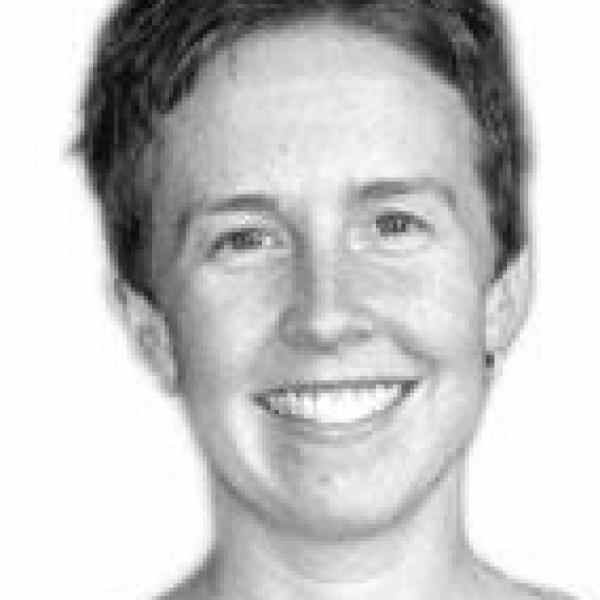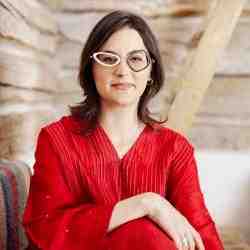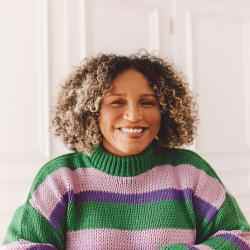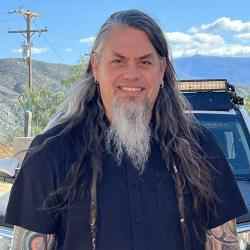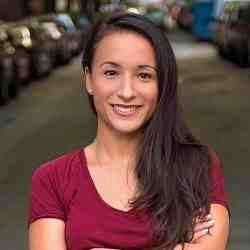Introduction
Carolyn Laub is creating a safer middle- and high-school environment for lesbian, gay, bisexual, transgender, and questioning youth by helping students found Gay-Straight Alliances and linking them in a youth-led network.
The New Idea
Gay-Straight Alliances have existed in American high schools for several years; as the name denotes, many of their members are straight. Sometimes straight youth join because they are the children or siblings of a gay person and are sensitized to discrimination. Carolyn has created a network of Gay-Straight Alliances (GSAs) that empowers them to grow and take on more sophisticated tactics in order to fight homophobia and make schools safer for youth. Through a variety of services, she helps students start GSAs, keep them going, get connected, access community resources, and become more effective in fighting homophobia on their campuses. She also demonstrates to them how homophobic violence and cruelty are often rooted in deep, embedded social attitudes not about sexual orientation but about gender expression and gender nonconformity. Gay-Straight Alliance Network, the organization Carolyn founded as her institutional base, is unique in several respects. It is student-led: the key decision-making body of the organization is a Youth Council made up of high school students who represent the counties where the network is active. It encourages GSAs to transform their orientation from support to activist. Student activism is an effective way to change the atmosphere on campuses. As part of this re-orientation, Carolyn provides GSAs with concrete suggestions for activities, events, and campaigns. Last, it aligns itself with other youth activist organizations in order to link lesbian, gay, bisexual, transgender, and questioning (LGBTQ) liberation with a larger social justice movement. By linking GSA activism with other youth-led organizations, and by launching multi-issue campaigns, Carolyn is able to broaden the focus of her constituency from issue politics to fighting all kinds of discrimination.
The Problem
Carolyn Laub's goal is the solution of homophobia in American schools, particularly high schools. Homophobia affects students who do not fit society's dominant heterosexual conventions in our society—LGBTQ youth are her most obvious, but not only, constituents. As a result of pervasive and often-sanctioned homophobia in schools, LGBTQ youth are disproportionately affected by isolation, depression, suicide, alcohol and substance abuse, dropping out of school, homelessness, and HIV and STD infections. Furthermore, the violence, both physical and verbal, that these students endure is astonishing. The National Coalition of Anti-Violence Programs reported a 34 percent increase in incidents of anti-LGBT violence in schools between 1996 and 1997. In the Bay Area, reported incidents of anti-LGBT violence more than doubled during this time period. A 1999 Gay, Lesbian, and Straight Education Network (GLSEN) study of five hundred gay students found that nearly half had experienced sexual harassment, 27.6 percent physical harassment, and 13.7 percent had been physically assaulted. Nearly all the participants surveyed had heard anti-gay language or insults in their schools, 30 percent reported hearing homophobic comments from faculty and 40 percent witnessed harassment of a student while a teacher failed to intervene.
Ending homophobia involves not just creating a "safe space" for LGBTQ youth, but transforming the cultural understanding of gender. Unfortunately, youth who might be best capable of leading this process are often silenced by hostile communities and unreceptive families.
As a result of these conditions, most LGBTQ youth tend to "come out" only in college or later in life, a situation that not only retards their own sexual and social development, but that robs non-LGBTQ youth of the opportunity to develop a more accurate understanding of gender and sexual orientation during their formative years.
Most organizations formed to address LGBTQ youth needs are led by adults and aim to serve only emotional, social, and recreational needs. Student-run, school-based activist clubs offer the most promising approach to ending homophobia. Still, organizers face enormous personal, cultural, and institutional obstacles. GSAs face three main limitations: isolation, lack of leadership and organization-building skills, and inadequate political analysis. When starting a GSA, students encounter resistance from teachers, administration, school boards, parents, or other students. Many will persevere only to have the GSA fail from lack of strategic planning or because its most charismatic leader graduates. Often, GSAs cannot "come out of the closet" and move beyond a basic support group.
The Strategy
Gay-Straight Alliance Network helps end the isolation GSA organizers face in getting started, dealing with resistance, setting goals, planning effective meetings, and forming coalitions with other students. The organization trains young people how to educate teachers and administrators, how to respond to homophobic slurs, and how to improve school harassment policies. It supplies intellectual and political analyses and tools for fighting homophobia and focuses GSAs on community organizing and lobbying.
Carolyn founded GSA Network in 1998. The organization's primary goals were to support the development of new GSAs and sustain existing GSAs, to build the capacity of existing GSAs in their efforts to make schools safer for all students and to create a thriving youth-led network. Since that time, Carolyn has helped students and teachers at more than fifteen Bay Area high schools start GSAs, while distributing information on starting and improving a GSA to more than fifty GSAs and seven hundred students. Other GSAs have started on their own and then joined GSA Network in order to receive support and be a part of a growing youth movement against homophobia. Carolyn markets GSA Network's presence through newsletters and a Web site, and also relies on word-of-mouth. Nearly every GSA in GSA Network has worked toward local awareness and change making in its school through activities promoted by the organization: protests, homophobia assessment surveys, teacher training, social events, celebrations, curriculum additions and reform, and peer education. Training youth activists has also figured prominently: GSA Network has trained over one hundred youth from thirty-seven schools and held the first-ever GSA Activist Camp in August 2000. Additionally, more than two hundred fifty high school students and GSA advisors have had the opportunity to meet and compare strategies at GSA Network's youth-run conference. Organizationally, GSA Network has fostered youth leadership by developing and training a Youth Council made up of high school students.
One of the major initiatives of Carolyn's work is empowering youth to be activists in state and local politics. For example, GSA Network provided all member GSAs with skills and information to fight Propositions 21 (Juvenile Justice Initiative) and 22 (Anti-Gay Marriage Initiative) in a recent California elections. Having been part of a successful movement to pass a state-wide school non-discrimination policy, GSA Network is training youth how to hold their school districts accountable to AB 537, the California Student Safety and Violence Prevention Act of 2000, which bars discrimination in public schools based on sexual orientation and gender identity. California is the fourth state to enact legislation prohibiting discrimination in schools based on sexual orientation and the first state to do so for gender identity. Carolyn and a colleague produced a printed and online student-organizing manual entitled, "Make it Real: A Student Organizing Manual for Implementing California's Nondiscrimination Law (AB 537)," which is now getting national distribution through GSA Network's Web site.
When she launched GSA Network, Carolyn identified forty existing GSAs. Now there are more than fifteen hundred students who are members of GSA clubs, and over 171,000 students in California high schools with GSA clubs on their campuses. Since every GSA has "out" members, the result is that those 171,000 students are growing up aware of LGBTQQ people. By undoing the isolation and self-hatred so many students might otherwise experience during a lifetime "in the closet," these acts of "coming out" will have significant ripple effects.
Carolyn's strategy for spreading beyond local impact involves creating printed and online material resources and training modules that can support the growth of more regionally-based GSA activist networks across the United States. Carolyn is also preparing to absorb the rest of the state of California into her current organization, most likely by establishing parallel programs in Southern California and Central California. These two additional regions will be part of a state-wide organization that can push school policy reform. In Carolyn's opinion, clusters of regional networks—rather than one monolithic national network—will be most effective in ensuring accurate representation and guaranteeing that each network can feasibly support training and activism. Carolyn is already consulting with interested individuals in Florida, Colorado, Wisconsin, and North Carolina about how to establish regional networks as well as on how to pass safe schools legislation similar to AB 537.
The Person
Carolyn was born in 1974 and grew up in a middle-class neighborhood where there were few minorities and no openly lesbian, gay, bisexual, or transgender people. Her father was a math professor who taught her to love math when she was in the early years of grammar school. When she was in third grade, she had to complete an assignment about a news article, and her father suggested she write about one that pointed out that, surprisingly, girls can do math as well as boys. She wrote a report on it and remembers it as an early expression of the themes of gender, stereotyping, and justice that would be so important in her life. She entered Stanford University at the age of seventeen and graduated Phi Beta Kappa in 1995 after having studied anthropology, biology, feminist theory, and linguistics. Interested more in the application of these disciplines than their theories, she developed confidence as an activist, fighting to end rape and violence against women and establish adequate disability access to campus buildings.
After graduation, Carolyn sought work in HIV prevention with youth but grew increasingly frustrated with individual behavior change and prevention education work. She felt that although such work helped individuals change their own behavior, it did not change the norms and power relationships that were contributing to the problem. At the same time, she founded a support group, Outlet, where she helped over fifty LGBTQ kids overcome internalized homophobia, work through conflicts with parents, develop strategies for coping with harassment other than abusing drugs and alcohol and skipping class, and develop a strong sense of identity and self-esteem. It was "an incredibly rewarding experience," says Carolyn, "but it often left me feeling frustrated as it was not a vehicle for addressing the social and cultural forces that left Outlet's participants feeling scared, lonely, fearful, or self-hating." One day an Outlet member came into the weekly meeting and sought input from the other members–her GSA had secured approval from their school's supportive principal to conduct a mandatory training for all teachers. The other students in the Outlet group represented several high schools in the area. "How did you start the group?" they asked. "How do you deal with taunts and threats?" "How did you get the administration to approve a mandatory training?"
At that moment, Carolyn says she knew she wanted to start an organization that would re-create this experience: young people leading and teaching each other how to organize effectively against the forces of homophobia and violence in their schools.
